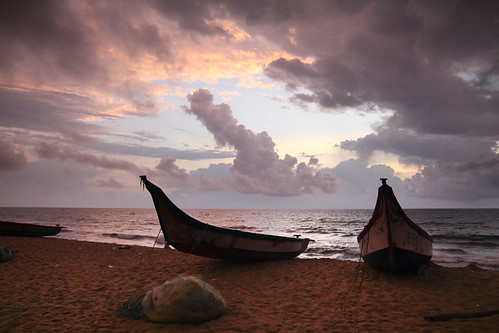 Australia and India are being urged to set up a security regime for the Indian Ocean to deal with threats such as piracy, people trafficking, failed states and rising sea levels.
Australia and India are being urged to set up a security regime for the Indian Ocean to deal with threats such as piracy, people trafficking, failed states and rising sea levels.Australia and India are being urged to set up a security regime for the Indian Ocean to deal with threats such as piracy, people trafficking, failed states and rising sea levels.
A new report says regional leadership on security is needed, as the balance of power shifts in the Pacific and around the rim of the Indian Ocean.
Professor Sanjay Chaturvedi, from India's Punjab University, is among the authors raising the concept of a wider Indo-Pacific maritime region. "The old geo-political world order is withering away," he said. "The geographies and cartographies of the new neo-political order are still somewhat hazy and are weighing on the horizon. "The boundaries between different parts of the world ocean are also now getting increasingly blurred, and that is why this emphasis on the Indo-Pacific."
Report editor Dennis Rumley says the Indian Ocean is the world's most important trade route, and is vital for Australia's economy and energy security. "[It is about] the flows of energy," he said. "Where is the flow of energy going to go? Well, we are going to be exporting uranium to India, so the Indian Ocean is going to become even more important as an energy highway/ "China has got a huge energy deficit; South Korea, Japan - all energy deficits - so where do they take their energy from? They've got to come down the west Pacific and through the Indian Ocean at some point or other."
The Indian Ocean region is under a variety of traditional and new threats, such as piracy, terrorism, people smuggling, rising sea levels and overfishing.
All the major players in the Indian Ocean, including China, India, the United States and Australia are inter-dependent. Professor Dennis Rumley says there is mutual interest in managing and resolving conflict . "If you look at security as a multi-dimensional thing, not just traditional, but including maritime, environmental and human and economic security, all of the regional security regimes occur at the sub-regional level - there is no overarching maritime regional authority," he said. "It is not just a state responsibility. The nature of threats are now beyond the state or within the state."
The report by the Australia India Institute says the approach to the Indian Ocean region needs to change. Professor Dennis Rumley says the current security arrangements are "fragile" and "incomplete". "I don't think you can solve problems of piracy, or people smuggling or whatever on a piecemeal basis, because there's a source of the problem and a solution to the problem," he said. "The actual source and the end result are both important...why people are moving here in the first place has to do with insecurity somewhere else, and that insecurity needs to be dealt with collectively."
Punjab University's Professor Sanjay Chaturvedi says the report suggests Australia and India assume regional leadership with an actively engaged Indo-Pacific region. "We believe, I suppose, that India and Australia have to show leadership role in operationalising this concept of a new energy security [and] maritime security regional organisation," he said.
Diplomacy could continue under the existing regional grouping, the Indian Ocean Rim Association for Regional Co-operation (IORARC). Australia's Parliamentary Secretary for Foreign Affairs says that role may be examined when Australia assumed the chair of the group in November. "Our approach to Indian Ocean Issues is incremental, but it is very purposeful," he said. "We are trying not to overreach particularly in regional organisations, but we are also taking care not set our sights and ambitions too low."
The Australian Senate has an inquiry underway into the Indian Ocean region, and the Australia-India relationship is expected to feature prominently in the next Defence White Paper due later this year.
Source: Radio Australia
Image courtesy of mrbichel via Flickr (CC BY 2.0)
